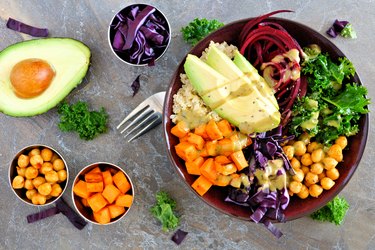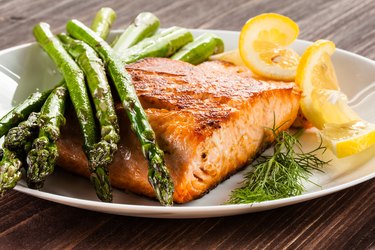
If you've been diagnosed with chronic obstructive pulmonary disease (COPD) — a condition where the airways in your lungs become thick and inflamed, making breathing more difficult — what you eat can affect how you feel.
Having COPD can make it hard to eat and maintain a healthy weight, which is why some people with the condition have unintentional weight loss, muscle loss and malnutrition, according to a June 2019 review in Nutrients.
Video of the Day
Video of the Day
For some people with COPD, when breathing increases and requires more energy, the body becomes hyper-metabolic, according to a December 2015 study in Translational Internal Medicine. This means the body is burning more calories. In these cases, it's often recommended to adopt a high-calorie, COPD-friendly diet.
COPD can also make it hard to exercise, which can lead to muscle weakness. Medications, stress, inflammation, depression and fatigue during eating also contribute to the difficulty in meeting nutritional needs with COPD.
Finally, people with COPD generally have higher levels of inflammation in their lungs, per the review in Nutrients, so eating more anti-inflammatory foods can be helpful for lung health.
With all that in mind, here are the best and worst foods for a COPD diet.
The Best Foods for Lung Health

1. Healthy Fats
Many nutrition professionals recommend a diet lower in carbohydrates and higher in fat for those with COPD.
"Metabolism of carbohydrates produces the most carbon dioxide, while the metabolism of fat produces the least," Lisa Young, RDN, a registered dietitian and professor at New York University, tells LIVESTRONG.com. "Therefore, for some patients with COPD, eating a diet with fewer carbohydrates and more fat helps them breathe easier."
There is limited evidence to support the blanket use of low-carbohydrate, high-fat diets by everyone with the condition, though, per the February 2020 Practice Guidelines for COPD published by the Academy of Nutrition and Dietetics (AND). One study found improved lung function in men (that's the terminology used in the study) with this type of diet, but the sample size was small and the study duration was short.
So, does this mean you need to ditch the carbs for good? Absolutely not. Carbs are an important source of fiber and antioxidants."I'm not a fan of keto. Adequate fiber is important, as is protein," Young says.
Instead, aim for a balance of carbs, protein and fat, including healthy sources of fat like:
2. Anti-Inflammatory Foods
COPD is characterized by increasing amounts of inflammation, and the degree of inflammation may determine how fast your health declines with COPD, according to the AND practice guidelines. Controlling that inflammation with diet may help.
Anti-inflammatory foods, including omega-3 fatty acids and foods high in antioxidants, have been shown to improve lung function and linked to a decreased risk of COPD, according to a November 2019 study in Primary Care Respiratory Medicine.
The following are considered anti-inflammatory foods:
- Oily fish like salmon and tuna
- Dark leafy greens like kale and spinach
- Whole grains like brown rice and whole-wheat pasta
- Berries
- Grapes
- Dark chocolate
- Ginger
- Cinnamon
The Mediterranean diet is a good example of an eating pattern that can help combat inflammation.
3. Vitamin D-Rich Foods or Supplements
Vitamin D, the sunshine vitamin, is important for immune health, heart health and healthy bones. It's also been studied for its effect on COPD.
According to the practice guidelines from AND, in 60 percent of studies on vitamin D and COPD, people with low vitamin D had more flare-ups — and supplementation decreased them.
This doesn't mean you should just supplement without getting your levels checked first. Ask your doctor to check your vitamin D to see if you are deficient. Based on your labs, your doctor can prescribe the best vitamin D regimen to get your levels back up to normal and, hopefully, see some improvement in lung function.
Here's why this is important: Taking a supplement if your vitamin D levels are already OK most likely won't help you, according to a January 2019 study in BMJ Thorax. This study did find, however, that flare-ups were decreased in vitamin D-deficient people who supplemented.
Whether or not you need a supplement, it's a good idea to include healthy foods high in vitamin D in your diet, such as:
- Trout
- Salmon
- Cremini, portobello and morel mushrooms
- Smoked whitefish
- Halibut
- Sardines
- Tilapia
- Fortified foods, including tofu, cow's milk and soy milk
Foods to Limit for Good Lung Health

Nixing smoking is the number one recommendation for improving lung function, according to a November 2016 study in BMC Pulmonary Medicine. But there are also specific foods linked to worsened lung health:
1. Processed Meats
Processed meat, which includes bacon, hot dogs, some deli meats and sausages, was found to be associated with poor lung function in the 2019 Nutrients review. One study found a 40 percent increased risk of COPD in people who ate more processed red meat in particular.
2. Added Sugars
Sugars that don't naturally occur in fruits, vegetables or dairy are considered added sugar if they have been added during processing. Foods with added sugars include:
- Soda and other soft drinks
- Condiments like ketchup and barbecue sauce
- Breakfast cereals and granola
- Baked goods and desserts
- Flavored yogurt
Check the label on packaged foods for the added sugar content.
The American Heart Association recommends limiting added sugars to 6 teaspoons each day for people assigned female at birth (24 grams) and 9 teaspoons each day for people assigned male at birth (36 grams).
3. Refined Grains
Refined grains include most products made with white flour (think: white bread and pasta, baked goods and desserts). The 2020-2025 Dietary Guidelines for Americans recommends making at least half of your grain intake whole grains, which include brown rice, oatmeal, bulgur and whole-wheat bread and pasta.
Where to Turn for Help With Your Diet
Navigating your way through a proper diet to treat your COPD can feel overwhelming, but it doesn't have to be. Ask your doctor for a referral to a registered dietitian who specializes in pulmonary nutrition to get you started.
An RD can help you manage symptoms that may be caused by diet, balance your macronutrients for your best lung health and provide advice on how to incorporate more anti-inflammatory foods and vitamin D into your diet.
- American Lung Association: "Learn About COPD"
- Nutrients: "Role of Diet in Chronic Obstructive Pulmonary Disease Prevention and Treatment"
- Journal of the Academy of Nutrition and Dietetics: "Chronic Obstructive Pulmonary Disease: A 2019 Evidence Analysis Center Evidence-Based Practice Guideline"
- Primary Care Respiratory Medicine: "A Clinical Trial to Evaluate the Effect of the Mediterranean Diet on Smokers Lung Function"
- Harvard Health Publishing: "Foods That Fight Inflammation"
- BMJ Thorax: "Vitamin D to Prevent Exacerbations of COPD: Systematic Review and Meta-Analysis of Individual Participant Data From Randomised Controlled Trial"
- 2020-2025 Dietary Guidelines for Americans
- American Heart Association: "Added Sugars"
- BMC Pulmonary Medicine: "Dietary Patterns are Associated with Lung Function Among Spanish Smokers Without Respiratory Disease"
Is this an emergency? If you are experiencing serious medical symptoms, please see the National Library of Medicine’s list of signs you need emergency medical attention or call 911.